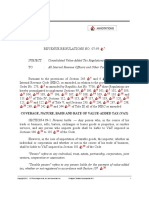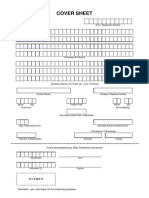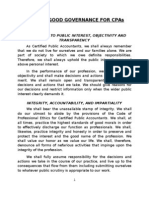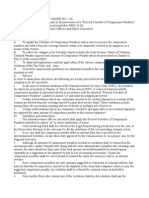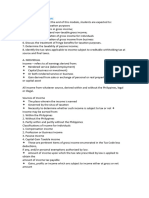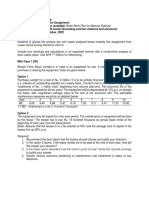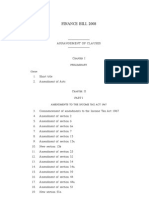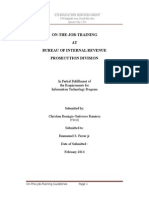RR 2-98
RR 2-98
Uploaded by
Joshua HorneCopyright:
Available Formats
RR 2-98
RR 2-98
Uploaded by
Joshua HorneCopyright
Available Formats
Share this document
Did you find this document useful?
Is this content inappropriate?
Copyright:
Available Formats
RR 2-98
RR 2-98
Uploaded by
Joshua HorneCopyright:
Available Formats
REVENUE REGULATIONS NO.
2-98 (April 17, 1998) WITHHOLDING TAXES ON INCOME PAYMENTS, COMPENSATION AND CREDITABLE VAT AND PERCENTAGE TAXES These regulations will govern the collection of taxes at source. It will be applied on all income paid beginning January 1, 1998. Final and Creditable Withholding Tax Withholding taxes on income payments consist of two types: final withholding taxes and creditable withholding taxes. Under the final withholding tax system, the amount of tax withheld by the withholding agent represents the full and final payment of the income tax due from the recipient of income. Thus, the taxpayer is no longer required to file a tax return for the particular income, or to include such income as part of the taxable income that he will be reporting under in his annual income tax return. On the other hand, under the creditable withholding tax system, the income recipient is still required to file an income tax return to report the income and to pay the difference between the tax due on the income and the tax withheld, if any.
Withholding Agents These withholding taxes are required to be deducted from the payment due to the recipient of income. The following persons are constituted as withholding agents, and thus, must withhold the applicable taxes on certain income payments they make: a. Corporations, association, partnerships, non-profit organizations, cooperatives, and other entities registered with the Securities and Exchange Commission and other government agencies mandated to register such entities. a. An individual engaged in business. However, even individuals not engaged in business are required to withhold taxes when they buy real property. a. All government offices including government-owned or controlled corporations. The obligation of the withholding agent to deduct and withhold the tax arises at the time an income is paid or payable, whichever comes first. The term "payable" refers to the date the obligation becomes due, demandable or legally enforceable.
Remittance of Withholding Taxes to BIR The withholding agent must pay the creditable withholding taxes it has deducted with the Authorized Agent Banks (AAB) located within the Revenue District Office (RDO) having jurisdiction over its residence or principal place of business.
The withholding tax return covering both creditable and final withholding taxes, must be filed and the taxes paid within 10 days after the end of each month, except for taxes withheld for December which should be filed on or before January 25 of the following year. However, the return for final withholding taxes on interest from bank deposits and yield or any other monetary benefit from deposit substitutes, trust funds and similar arrangements is required to be filed and the payment made within twenty five (25) days from the close of each calendar quarter. For taxpayers classified as Large Taxpayers, the filing of the return and the payment of tax should be made within twenty five (25) days after the end of each month. Payment must be made with the branch of the Land Bank of the Philippines or Development Bank of the Philippines located at the BIR National Office.
Liability of Withholding Agent The withholding agent will be liable for the withholding tax that should have been collected, together with the applicable penalties, i.e., the 25% surcharge and 20% interest on the total amount due. In addition, unless he pays such withholding taxes, his claim for the deductibility of such payments against his gross income will be disallowed.
Payments Subject to Final Withholding Tax The following forms of income will be subject to final withholding tax at the rates specified.
Income Payment
Tax Rate
Payee * Citizen or resident alien individual * Non-resident alien engaged in trade or business * Domestic corporation
Interest from peso bank deposit
20%
* Resident foreign corporation
25%
* Non-resident alien not engaged in trade or business
34% in 1998; 33% in 1999 * Non-resident foreign corporation
32% in 2000 and thereafter 7.5% Interest income from a depository bank under the foreign currency deposit system * Resident citizen or alien individual * Domestic corporation
* Resident foreign corporation
* Exempt
Non-resident alien
* Non-resident foreign corporation * Citizen or resident alien individual * Non-resident alien engaged in trade or business * Domestic corporation
Yield from deposit substitutes and trust funds; royalties, in general; prizes exceeding P10,000; other winnings, except PCSO and lotto winnings
20%
* Resident foreign corporation
25%
* Non-resident alien not engaged in trade or business
34% in 1998; 33% in 1999; 32% in 2000 and thereafter * Citizen or resident alien individual * Non-resident alien engaged in trade or business More than 5 yrs Interest income from longterm deposit or investment * Citizen or resident alien individual * Non-resident foreign corporation
Royalties on books, other literary works and musical compositions
10%
in savings, trust funds, deposit substitutes based on the length of time instrument was held by taxpayer
Exempt 4 to 5 yrs. - 5% 3 to less than 4 yrs. - 12% Less than 3 yrs. - 20% 6% in 1998;
* Non-resident alien engaged in trade or business
Cash and/or property dividends from domestic corporation, joint stock company, insurance or mutual fund companies or share in distributable net income of partnership
8% in 1999 10% in 2000 and thereafter
* Citizen or resident alien individual
20%
* Non-resident alien engaged in trade or business
25%
* Non-resident alien not engaged in trade or business
34% in 1998; 33% in 1999; 32% in 2000 and thereafter Sale, exchange or other disposition of real property located in the Philippines classified as capital asset * 6% on the gross selling price or fair market value, whichever is higher Citizen or resident alien * Non-resident foreign corporation
* Non-resident alien engaged in trade or business * Non-resident alien not engaged in trade or business * Domestic corporation
15% Compensation income, except income subject to
Alien employees and Filipinos employees occupying the same position as those of alien
employed by fringe benefit tax * Regional or area headquarters * Regional Operating headquarters * Representative offices * units Offshore banking
* Foreign Petroleum Service Contractors and Sub-contractors FCDUs Income derived from foreign currency transactions with residents, including local commercial banks, branches of foreign banks, and other FCDUs/OBUs 10% OBU
Profit remitted by Philippine branch, except those registered with PEZA, SBMA and CDA.
15%
Head office of foreign corporation
Gross income from all sources within the Philippines
25%
Non-resident cinematographic film owners, lessors or distributors
Gross rentals, lease and charter fees
4.5%
Non-resident owner of lessor of vessels from leases or charters to Filipino citizens or corporations
Gross rentals, charter and other fees
7.5%
Non-resident lessor of aircraft, machineries and other equipment
Interest on foreign loans contracted on or after August 1, 1986
20%
Non-resident foreign corporation
Dividends from a domestic corporation
15%
Non-resident foreign corporation
34% in 1998; Fringe benefits granted or furnished by the employer 33% in 1999; 32% in 2000 and thereafter
* Citizen or resident alien individual * Non-resident alien engaged in trade or business
25%
* Non-resident alien not engaged in trade or business Alien employees and Filipinos employees occupying the same position as those of alien employed by * Regional or area headquarters * Regional Operating headquarters * Representative offices * units Offshore banking
15%
* Foreign Petroleum Service Contractors and Sub-contractors
Informers reward
10%
Persons instrumental in the discovery of violations of Tax Code and discovery and seizure of smuggled goods
Payments Subject to Creditable Withholding Tax Creditable withholding taxes will be applied on the following items of income payments made by persons residing in the Philippines:
Income Payment/Payee Professional, promotional and talent fees for the services rendered by the following individuals
Tax Rate
10% * * * * * * * * Individuals engaged in the practice of profession Professional entertainers Professional athletes Directors in movies, stage, radio, television and musical productions Insurance agents and insurance adjusters Management and technical consultants Bookkeeping agents and agencies Other recipients of talent fees
* Fees of directors who are not employees of the company paying such fees, whose duties are confined to attendance at and participation in the meetings of the board of directors.
Professional fees, talent fees or other forms of remuneration to taxable juridical persons Rentals paid to lessors of real property used in business
5%
5% (Previous minimum lease of P5,000 was deleted.)
Cinematographic film rentals and other payments to resident individuals and corporate cinematographic film owners, lessors or distributors Gross payments to
5%
1% * * * * General engineering contractors General building contractors Specialty contractors Other contractors filling, demolition and salvage work contractors and operators of drilling apparatus
operators of dockyards
persons engaged in the installation of water system, and gas or electric light, heat or power operators of stevedoring, warehousing or forwarding establishments transportation contractors printers, bookbinders, lithographers and publishers
messengerial, janitorial, private detective and/or security agencies, credit and/or collection agencies and other business agencies advertising agencies
independent producers of television, radio and stage performances or shows independent producers of "jingles" labor recruiting agencies
persons engaged in the installation of elevators, air conditioning units, computer machines and other equipment and machineries and maintenance services thereon; persons engaged in the sale of computer services, landscaping services and collection and disposal of garbage TV and radio station operators on sale of TV and radio airtime
TV and radio blocktimers on sale of TV and radio commercial spots.
Income distribution to beneficiaries of estates and trusts, except such income subject to final withholding tax and tax-exempt income
15%
Gross commissions to customs, insurance, real estate and commercial brokers and fees of agents of professional entertainers
5%
Drawings, advances, sharings, allowances, stipends and other payments made by a general professional partnership to its partners
10%
Professional fees paid to medical practitioners by hospitals and clinics or by patients through the hospital or clinic
10%
Gross selling price or total amount of consideration for the sale, exchange or transfer of real property, other than capital assets, by an individual, corporation, estate, trust, trust fund or pension fund a) if habitually engaged in the real estate business 1.5% 3.0% 5.0%
P500,000 or less More than P500,000 but not exceeding P2 M More than P 2 Million
b)
Not habitually engaged in the real estate business 7.5%
Additional income payment to government personnel for overtime services from importers, shipping and airline companies, or their agents
15%
Gross amounts paid by credit card company to any business entity, natural or juridical person, representing sales of goods/services made to cardholders
Income payments made by any of the top 5,000 corporations to their local supplier of goods
1%
Income payments made by a government office on their purchases of goods from local suppliers, except any single purchase which is P10,000 and below
1%
Tax Credit or Refund The creditable taxes withheld from the income of a taxpayer are allowed as tax credit against his income tax liability in the quarter(s) of the taxable year in which the income (subjected to withholding tax) was earned or received. In case the total creditable withholding taxes that were deducted during the year from the taxpayer exceed his income tax due for the year, at his option, the excess creditable withholding taxes may a. Automatically be applied as a credit against his income tax due for the taxable quarters/years immediately succeeding the taxable quarters/years in which the excess credit arose. However, the taxpayer is required to submit with his income tax return a
copy of the first page of his income tax return for the previous taxable period, showing the amount of his excess withholding tax credits. Such tax return must show that he has not opted for a cash refund or tax credit, or a. He may request from the BIR for a cash refund or a tax credit certificate for use in payment of his other national internal revenue tax liabilities. A written request therefor must be submitted to the BIR within two (2) years after the payment of the tax. Withholding Tax on Compensation In general, the withholding of tax on compensation income will apply to all employed individuals, whether citizens or aliens, deriving income from compensation for services rendered in the Philippines. An "employee" is an individual performing services under an employer-employee relationship. An employeremployee relationship exists when the person for whom the services were performed has the right to control and direct the individual who performs the services, not only as to the result to be accomplished, but also as to the details and means by which such results are accomplished. No distinction is made between classes or grades of employees. Thus, superintendents, managers and officers are considered as employees. However, employees whose total annual compensation does not exceed the statutory minimum wage of P5,000 monthly or annual salary of P60,000, whichever is higher, may exercise any of these options: a. His compensation income will be subjected to withholding tax, but he would not be required to file the income tax return, or a. His compensation income would not be subject to a withholding tax but he will file his annual income tax. Where the employee has chosen to have his compensation income subjected to withholding, he must execute a waiver in a prescribed BIR form of his exemption from withholding. This would constitute as the authority for the employer to apply withholding tax on his compensation. Non-resident citizens are taxable only on their income derived from Philippine sources. Thus, their income from sources outside the Philippines are not taxable, and hence, not subject to withholding tax.
Compensation Subject to Withholding All compensation paid to the employee is subject to withholding tax. Compensation includes all remuneration for services performed by an employee for his employer under an employer-employee relationship. The name by which the payment for employees services is called is immaterial. Thus, the following terms are considered as compensation income: o o o o o o o o Salaries, Wages, Emoluments and honoraria, Allowances Commissions Fees, including directors fees if the director us at the same time an employee of the employer Taxable bonuses Fringe benefits, except those which are subject to the fringe benefits tax
Taxable pensions and retirement pay
Remuneration for services is considered compensation even if the employer-employee relationship no longer exists at the time when the payment is made. Thus, it is subject to withholding. Exemption from Withholding Tax The following payments or benefits paid or provided by the employer are tax-exempt, and thus, not subject to withholding tax: 1. Retirement benefits received under Republic Act 7641 and those received by officials and employees of private firms under a reasonable private benefit plan maintained by the employer which meets the following requirements: a. The plan must be reasonable; a. The benefit plan must be approved by the BIR; a. The retiring official must have been in the service of the same employer for at least ten (10) years and is not less than fifty (50) years of age at the time of retirement, and a. The retiring official or employee should not have previously availed of the privilege under the retirement benefit plan of the same or another employer. 1. Any amount received by an employee or by his heirs from the employer due to death, sickness or other physical disability or for any cause beyond the control of said employee, such as retrenchment, redundancy or cessation of business. Amounts received by reason of involuntary separation will be exempt from income tax even if the employee, at the time of separation, had rendered less than ten (10) years of service and/or is below fifty (50) years of age. 1. Social security benefits, retirement gratuities, pensions and other similar benefits received by residents or non-resident citizens or aliens who come to reside permanently in the Philippines from foreign government agencies and other institutions, private or public. 1. Payment of benefits under the law of the United States administered by the United States Veterans Administration. 1. Payment of benefits made under the Social Security System Act of 1954. 1. Benefits received from the GSIS Act of 1937, and the retirement gratuity received by government officials and employees. 1. Remuneration paid for agricultural labor 1. Remuneration paid for domestic services. However, the services of household personnel furnished by the employer to an employee who is holding managerial or supervisory position, shall be subject to the Fringe Benefits Tax.
1. Remuneration paid for labor which is occasional, incidental or irregular, and does not promote or advance the employers trade or business 1. Compensation for services by a citizen or resident of the Philippines for a foreign government or an international organization 1. Actual, moral, exemplary and nominal damages in connection with a final judgment or compromise agreement arising out of or related to an employer-employee relationship. 1. Life insurance proceeds paid to the heirs or beneficiaries upon death of the employee. However, interest payments agreed under the policy for the amounts which are held by the insured will be included in the gross income. 1. Amounts received by the insured as a return of premium 1. Compensation for injuries or sickness 1. Income exempt under any treaty obligation binding upon the Philippine government 1. Facilities or privileges are of relatively small value which are offered or furnished by the employer merely as a means of promoting the health, goodwill, contentment or efficiency of his employees. Thus, if living quarters or meals are furnished to an employee for the convenience of the employer, the value of such benefits need not be included as part of compensation income. 1. Advances or reimbursements for travelling, representation and other ordinary and necessary expenses incurred by the employee in the performance of his duties, if the employee is required to account/liquidate for said expenses. The excess of actual expenses over advances made shall be treated as taxable income if such amount is not returned to the employer. 1. The monetized value of unutilized vacation leave credits of ten (10) days or less which were paid to the employee during the year. 1. GSIS, SSS, Medicare and Pag-ibig contributions and union dues of individual employees 1. Thirteenth (13th) month pay and other benefits such as Christmas bonus, productivity incentive bonus, loyalty awards, gifts and other benefits of similar nature to the extent that the total amount thereof does not exceed P30,000. Computation of Withholding Tax There is a prescribed table for computing the withholding tax on compensation, with the applicable rates depending on the range of compensation and the personal and additional exemptions that employee is entitled to. Withholding tax on compensation is due when the employer pays such compensation. Hence, the BIR has provided four (4) types of withholding tables that would suit the payroll period being followed by the employer - daily, weekly, semi-monthly, and monthly. The following procedure is followed in computing for the amount of tax to be withheld:
1. Use the appropriate tables for the payroll period: monthly, semi-monthly, weekly or daily, as the case may be. 1. Determine the total monetary and non-monetary compensation paid to an employee for the payroll period, segregating gross benefits which includes thirteenth (13 th) month pay, productivity incentives, Christmas bonus, and other benefits received by the employee per payroll period. Gross benefits in the amount of thirty thousand pesos (P30,000) or less shall be exempted from income tax and from withholding tax. 1. Segregate the taxable compensation from the non-taxable income paid to the employee for the payroll period. The taxable income refers to all remuneration paid to an employee not otherwise exempted by law from income tax, while the non-taxable income are those which are specifically exempted from income tax by the Tax Code or by other special laws. 1. Segregate the taxable compensation income into regular taxable compensation income and supplementary compensation income. Regular compensation includes basic salary, fixed allowances for representation, transportation and other allowances paid to an employee per payroll period. Supplementary compensation includes payments to an employee in addition to the regular compensation, with or without regard to a payroll period. 1. Fix the compensation level as follows: i. Determine the line (horizontal) corresponding to the status and number of qualified dependent children using the appropriate symbol for the taxpayer status. Determine the column to be used by taking into account only the total amount of taxable regular compensation income. The compensation level is the amount indicated in the line and column to which the regular compensation income is equal to or in excess, but not to exceed the amount in the next column of the same line.
i.
1. Compute the withholding tax due by adding the tax predetermined in the compensation level indicated at the top of the column, to the tax on the excess of the total regular and supplementary compensation over the compensation level, which is computed by multiplying the excess by the rate also indicated at the top of the column.
Annualization of Withholding Tax When the employer-employee relationship is terminated before the end of the year, or at the end of the year, the employer is required to determine the amount of tax that still has to be withheld from the total compensation that he has paid to the employee. To compute for the final adjustment, the following procedures will be observed: 1. Determine the total taxable regular and supplementary compensation paid to the employee during the year.
1. If the employee has previous employment/s within the year, add the amount of taxable regular and supplementary compensation paid to the employee by the previous employer, if any. 1. Deduct from the aggregate amount of compensation the amount of the total personal and additional exemptions of the employee. 1. Deduct the amount of premium payments on health and/or hospitalization insurance of employees who have presented evidence that they have paid during the taxable year premium payments (the deductible amount shall not exceed P2,400 or P200 per month, whichever is lower) and that their familys total gross income does not exceed P250,000 for the calendar year. For this purpose, the employer should ask the employee to present the policy contract together with the original official receipt of the premium payment. The BIR will prescribe in a separate regulation the documents to be presented to determine the aggregate of the employees family income. 1. Compute the amount of tax on the difference in accordance with the following table:
Not over P10,000
5%
Over P10,000 but not over P30,000..
P500 + 10% of the excess over P10,000 P2,500 + 15% of the excess over P30,000 P8,500 + 20% of the excess over P70,000 P22,500 + 25% of the excess over P140,000 P50,000 + 30% of the excess over P250,000 P125,000 + 34% of the excess over P500,000 in 1998; 33% in 1999; 32% in 2000 and thereafter
Over P30,000 but not over P70,000..
Over P70,000 but not over P140,000
Over P140,000 but not over P250,000
Over P250,000 but not over P500,000
Over P500,000
1. Determine the deficiency (or excess) of the tax computed over the cumulative taxes already deducted by the present employer and previous employer, if any, since the beginning of the current calendar year. The deficiency tax shall be deducted from the last payment of compensation for the calendar year.
In case the deficiency tax is more than the amount of last compensation to be paid, the employer shall be liable to pay the amount of tax which cannot be collected from the employee. The employer and employee shall come to an agreement on how the amount advanced by the employer will be settled. If the tax withheld from the employee since the beginning of the year is more than the tax required to be withheld, the excess shall be credited or refunded to the employee not later than January 25 of the following year. In return, the employer is allowed to deduct the amount refunded from the remittable amount of taxes withheld from compensation income in the current month when such refund was made, and in the succeeding months thereafter until the amount refunded by the employer is fully paid.
Withholding Exemptions In the computation of the withholding tax due from compensation paid to an employee, the employer must consider the personal and additional exemptions that such employee is entitled to. In order to receive the benefit of such exemptions, the employee must file the Application for Registration (BIR Form No. 1902) upon employment. To report changes in his exemption, he must file a Withholding Compensation and Exemption Certificate (Form No. 2305). Beginning January 1, 1998, each employee shall be allowed to claim the following amount of exemptions: 1. Basic Personal exemption For single individual or married individual judicially decreed as legally separated with no qualified dependents - Twenty Thousand pesos (P20,000.00) For head of a family, Twenty Five Thousand pesos (P25,000.00). A "head of family" refers to an unmarried or legally separated man or woman with a parent, brother or sister or legitimate or illegitimate, recognized naturally or legally adopted children living with and dependent upon him for their chief support, where such brother or sister or child are not more than 21 years of age, unmarried and not gainfully employed or, regardless of age, are incapable of support because of mental or physical defect. The term also includes an unmarried or legally separated man or woman who is the benefactor of a qualified senior citizen. For each legally married individual, Thirty two thousand pesos (P32,000). 2. Additional Exemption for dependents A married individual or head of family shall be allowed an additional exemption of Eight Thousand pesos (P8,000.00) for each qualified dependent child. However, the total number of dependents for which an additional exemption can be claimed, must not exceed four (4).
A dependent may be a legitimate, illegitimate or legally adopted child who is chiefly dependent for support upon and living with the taxpayer. He must be not more than 21 years of age, unmarried and not gainfully employer. If mentally or physically handicapped, he would still qualify as dependent, regardless of age. The husband is deemed as the proper claimant of the additional exemption, unless he explicitly waives his right in favor of his wife. Where the spouse is unemployed or is a non-resident citizen deriving income from foreign sources, the employed spouse who is working in the Philippines shall automatically be entitled to claim the additional exemption for the children.
Use of Withholding Taxes on Compensation Withholding taxes on compensation are creditable. The employee is still required to report in his individual income tax return the compensation subjected to withholding by his employer as part of his gross income and, using this as basis, compute his total income tax liability. He is then allowed to claim as tax credit the withholding taxes deducted by his employer, and pay only the remaining balance of the income tax.
Liability of Employer An "employer" is a person for whom an individual performs or performed any service, of whatever nature, under an employer-employee relationship. The term also refers to the person having control of the payment of the compensation in cases where the person for whom the services were performed does not exercise such control. A person paying compensation on behalf of a non-resident alien individual or foreign corporation, which is not engaged in business in the Philippines, is also considered as employer. The amount of any tax withheld by the employer is a special fund held in trust for the government. Any person who expects to make payment of compensation in the amount of P60,000 or more during the year, or P5,000 monthly, to any single employee must register by filing with the Revenue District Office where his legal residence or place of business is located an Application for Registration as withholding agent not later than ten (10) days after becoming an employer. The employer shall make a return and pay such tax on or before the 10 th day of the month following the month in which the withholding was made to any AAB within the Revenue District Office where the employers place of business or legal residence is located. However, taxes withheld from the last compensation for the year shall be paid to the BIR not later than January 25 of the succeeding year. For large taxpayers, the withholding taxes must be remitted on or before the 25 th day of the following month. The employer is required to furnish every employee from whose compensation taxes have been withheld the Certificate of Income Tax Withheld on Compensation (Form No. 2316, formerly Form No. W-2). The certification must be issued to the employee on or before January 31 of the following year, or if his employment is terminated before the close of the year, on the day on which the last payment of compensation is made. On or before January 31st of the following year, the employer is required to file with the BIR the Annual Information Return of Income Tax Withheld on Compensation (BIR Form No. 1604), together with an alphabetical list of employees, both in duplicate copies.
Penalties for Non-compliance 1. Failure to Withhold. Every person who is required to withhold the tax from the compensation of an employee is liable for the payment of such tax to the BIR. In addition to the tax required to be paid, a penalty equivalent to 25 per cent of the amount due shall be imposed in the following cases: a. Failure to file any return and pay the tax due thereon as required under the Tax Code or regulations on the date prescribed; or a. Filing a return with the wrong BIR office a. Failure to pay the deficiency tax within the time prescribed for its payment in the notice of assessment; a. Failure to pay the full or part of the amount of tax shown on any return required to be filed, or the full amount of tax due for which no return is required to be filed, or before the date prescribed for its payment; or a. In case of willful neglect to file the return within the period prescribed, or in case a false or fraudulent return is willfully made, the penalty to be imposed shall be 50% of the deficiency tax, in case any payment has been made on the basis of such return before the discovery of the falsity or fraud. In addition, interest shall be assessed and collected on any unpaid amount of tax at the rate of 20 percent per annum, or such higher rate as may be prescribed for payment until the amount is fully paid. Such liability stays even if the employee subsequently pays the tax. In such a case, employer shall be liable for penalties and/or additions to the tax for failure to deduct and withhold the tax within the prescribed time. 2. Filing of Certain Information Return. For every failure to file an information return, statement or list, or keep any record or supply any information required, the employer shall subject to penalty of P1,000. However, the aggregate amount to be imposed for all such failures during a calendar year will not exceed P25,000. 3. Failure to refund excess tax withheld on Compensation. Any employer who fails or refuses to refund excess withholding tax not later than January 25 of the succeeding year shall be liable to a penalty equal to the total amount of refunds which was not refunded to the employee. In addition, the employer will be fined not less than P10,000 and imprisoned of not less than one (1) year but not more than ten (10) years.
Registration of Employees as Taxpayers Every employee is required to register as a taxpayer. For this purpose, he must accomplish the Application for Registration for Individuals Earning Compensation Income (BIR Form No. 1902) with the following information:
Name Taxpayers Identification Number (TIN) Address Status of employee - Single/Legally Separated/Widow or widower with no dependent child/ Married/Head of Family Status of spouse of the employee Qualified dependents - name and date of birth Claimant of exemption for children
The following forms, if applicable, are required to be attached to the application: Marriage contract Court decision of legal separation Birth Certificate of each qualified dependent Certificate of employment of the husband if he is working abroad Waiver of exemptions of children by the husband in case wife is claiming the additional exemptions of the children Waiver from exemption on withholding tax of taxpayers whose total compensation income in a year does not exceed P60,000 Medical certificate of dependent if physically or mentally incapacitated Court decision of legal adoption of children Death certificate Current certificate of income tax exemption of qualified senior citizen
The employer with whom the employees Application for Registration is filed must indicate the date when he received the form and accomplish Part V of the application pertaining to Employers information such as TIN, registered name and other relevant information. All employees who have not filed the application for registration as of December 31, 1997 shall accomplish and file the application with their employers not later than April 30, 1998. New employees shall accomplish and file the application within ten (10) days from the start of employment. All applications must be transmitted by the employer to the Revenue District Officer where the employer has his legal residence or place of business within 30 days from receipt thereof. If an employee fails or refuses to file an Application for Registration, the employer shall compute the withholding tax under the schedule for zero exemption. In case the employee fails to update his Exemption Certificate, the employer will withhold taxes based on the reported personal exemptions existing prior to the change of status.
Withholding of Creditable Value-added tax In general, VAT due on sales of goods and services are not subject to withholding since the tax is not determinable at the time of sale. However, gross payments made by the government to sellers of goods and services would be subject to withholding to wit:
Payments for purchases of goods
3%
Payments for services rendered
6%
Payments made to government public work contractors Payments for lease or use of property or property rights to non-resident owners
8.5%
10%
The withholding agents shall accomplish the Monthly VAT Tax declaration (BIR form 2550M) and pay the amount withheld with the authorized agent bank located within the Revenue District Office (RDO) having jurisdiction over the place where the government office is located. The return shall be filed and payments made within ten (10) days following the end of the month the withholding was made, except taxes withheld for the 3rd month of the quarter which would be remitted through a Quarterly VAT Tax return (BIR Form 2550Q) to be filed not later than the 25 th day after the end of the calendar quarter. The withholding agent is required to furnish each seller of goods and services from whom taxes has been deducted, the Certificate of Creditable Tax Withheld at Source (BIR Form 2307) in quadruplicate copies. The first three copies will be given to the seller not later than the 15 th of the following month, while the fourth copy will be retained by the withholding agent.
Withholding of Percentage Taxes on Government Money Payments Money payments made by bureaus, offices and instrumentalities of the government to private individuals, corporations, partnerships and/or associations are subject to withholding at the following rates:
Type of Income Payment/ Payee
Rate
Persons exempt from VAT for the reason that their annual gross sales or receipts do not exceed P550,000
3%
Domestic carriers and keepers of garages
3%
International air and shipping carriers
3%
Grantees of franchise on radio and or television broadcasting companies whose annual gross receipts of the preceding year does not exceed P10,000
3%
Grantees of franchise on electric, gas and water utilities
2%
Banks and non-bank financial intermediaries a) On interest, commissions and discounts based on the remaining maturities of the instrumentShort-term (not exceeding 2 years) Medium-term (2 years - 4 years) Long-term maturity 5% 4 years - 7 years 3% Over 7 years 1% b) c) On dividends 0% On royalties, rentals of property, profits from exchange and other gross income 0% 5% Finance companies and other financial intermediaries not performing quasi-banking functions a) On interest, discounts and other items of gross income paid to finance 5%
b) On interest, commissions and discounts paid from their loan transactions based on the remaining maturities of the instruments: Short-term (not exceeding 2 years) Medium-term (2 years - 4 years) Long-term maturity 4 years - 7 years Over 7 years 5% 3% 1% 0%
Life insurance companies
5%
Agents of foreign insurance companies Proprietors, lessee or operator of a) Cockpits
10%/5%
18%
b) c) d) e)
cabarets, night and day clubs boxing exhibitions professional basketball games jai-alai and racetracks
18% 10% 15% 30%
Sale, barter or exchange of shares of stock listed and traded through the local stock exchange
of 1% on the gross selling price 4% 2% 1%
Shares of stock sold or exchanges through initial public offering Not over 25% 25% - 33 1/3% Over 33 1/3%
Taxes deducted and withheld will be covered by the Monthly Return of Internal Revenue Taxes withheld on Government Money payments (BIR Form 1600) which should be filed and payments made within ten (10) days following the end of the month the withholding was made. Effectivity The regulations shall be applicable to compensation income paid beginning January 1, 1998. No penalties will be imposed until May 15, 1998 for non-compliance of these regulations that implement new provisions of the Code.
You might also like
- BIR Benchmarking RatesDocument4 pagesBIR Benchmarking RatesMark Aguinaldo75% (4)
- RAMO 1-20 Updated Handbook On Audit Procedures and TECHNIQUEDocument96 pagesRAMO 1-20 Updated Handbook On Audit Procedures and TECHNIQUEDante JulianNo ratings yet
- SGV Co. Briefing EOPT ActDocument23 pagesSGV Co. Briefing EOPT ActFlores Renato Jr. S.100% (2)
- Ramo 1-2000Document177 pagesRamo 1-2000Kris Calabia100% (2)
- Trade and Cash Discount Practices in The PhilippinesDocument2 pagesTrade and Cash Discount Practices in The PhilippinesAileen Dela CruzNo ratings yet
- RR 7-95 Consolidated VATDocument64 pagesRR 7-95 Consolidated VATjankriezlNo ratings yet
- Quality Accreditation Checklist Form 4Document1 pageQuality Accreditation Checklist Form 4Joy Dimaano50% (2)
- SEC Cover SheetDocument1 pageSEC Cover Sheetlouiegwapito100% (4)
- BIR Regulations On Service ChargeDocument3 pagesBIR Regulations On Service ChargeMichelle Ann S. Ferriol100% (1)
- CARMELO D. FAZON - Internal Quality Review ProceduresDocument3 pagesCARMELO D. FAZON - Internal Quality Review ProceduresCarmelo Fazon0% (1)
- BIR Ruling (DA - (C-066) 228-09) - Capital Infusion in The Form of APIC Not Subject To Donor's TaxDocument8 pagesBIR Ruling (DA - (C-066) 228-09) - Capital Infusion in The Form of APIC Not Subject To Donor's TaxJerwin Dave100% (1)
- IT - RR 12-2011 LESSOR Reportorial Requirements PDFDocument5 pagesIT - RR 12-2011 LESSOR Reportorial Requirements PDFMark Lord Morales BumagatNo ratings yet
- BIR FORM 1902 - Application For RegistrationDocument1 pageBIR FORM 1902 - Application For RegistrationAldrin Frank ValdezNo ratings yet
- BIR Audit ManualDocument89 pagesBIR Audit ManualRivera RwlrNo ratings yet
- BIR Ruling (DA - (C-005) 023-08) (Condonation of Debt)Document5 pagesBIR Ruling (DA - (C-005) 023-08) (Condonation of Debt)Archie Guevarra100% (3)
- Professional Regulation Commission Board of Accountancy Quality Accreditation Checklist Pursuant of ORB Resolution No.Document1 pageProfessional Regulation Commission Board of Accountancy Quality Accreditation Checklist Pursuant of ORB Resolution No.Gualberto Plasos67% (3)
- BIR Clarification On Senior Citizens DiscountDocument13 pagesBIR Clarification On Senior Citizens DiscountPaolo Antonio EscalonaNo ratings yet
- RMC 35-06 Clarifying Proper VAT and EWT Treatment of Freight and Other Incidental Charges Billed by Freight ForwardersDocument19 pagesRMC 35-06 Clarifying Proper VAT and EWT Treatment of Freight and Other Incidental Charges Billed by Freight ForwardersPrintet080% (1)
- Notice of DiscrepancyDocument4 pagesNotice of DiscrepancyMartin Pagtanac100% (1)
- Ramo 1-2019Document74 pagesRamo 1-2019Donato Vergara IIINo ratings yet
- BIR Revenue Regulations No. 2-98Document93 pagesBIR Revenue Regulations No. 2-98Maan Espinosa100% (4)
- BIR Ruling On How To Compute Book Value If There Is Unpaid SubscriptionDocument3 pagesBIR Ruling On How To Compute Book Value If There Is Unpaid SubscriptionBobby LockNo ratings yet
- BIR Revenue Regulation No. 02-98 Dated 17 April 1998Document74 pagesBIR Revenue Regulation No. 02-98 Dated 17 April 1998wally_wanda93% (14)
- Code of Good Governance For CpasDocument4 pagesCode of Good Governance For CpasCatherine Villanueva Mendoza57% (7)
- Picpa (Functions)Document18 pagesPicpa (Functions)Rheneir MoraNo ratings yet
- RR 16-08Document5 pagesRR 16-08matinikkiNo ratings yet
- Rmo No 9-06 TCVD Tax MappingDocument16 pagesRmo No 9-06 TCVD Tax MappingGil PinoNo ratings yet
- RR 2-98Document136 pagesRR 2-98hizelaryaNo ratings yet
- BirDocument8 pagesBirDominique VasalloNo ratings yet
- Rmo 32-01Document5 pagesRmo 32-01matinikki100% (1)
- Revenue Regulations No 2-2015Document4 pagesRevenue Regulations No 2-2015Yaz Carloman0% (1)
- Attachment To State Tax Including Cpa Cert PDFDocument4 pagesAttachment To State Tax Including Cpa Cert PDFBradNo ratings yet
- 1338 Metropolitan Fabrics Vs Prosperity CreditDocument9 pages1338 Metropolitan Fabrics Vs Prosperity CreditJoshua HorneNo ratings yet
- RR 2-98Document85 pagesRR 2-98restless11No ratings yet
- RMO No. 6-2023Document11 pagesRMO No. 6-2023Anostasia NemusNo ratings yet
- RR 2-98Document41 pagesRR 2-98matinikki100% (2)
- Rmo 1-90Document14 pagesRmo 1-90cmv mendoza100% (2)
- Rmo 19-2007Document14 pagesRmo 19-2007Em CaparrosNo ratings yet
- Revenue Memorandum Order No. 53-98Document25 pagesRevenue Memorandum Order No. 53-98johnnayel50% (2)
- Affidavit of Accuracy of Contents of Submitted Registration DocumentsDocument2 pagesAffidavit of Accuracy of Contents of Submitted Registration DocumentsJohnime43% (7)
- RMC No. 32-2022Document5 pagesRMC No. 32-2022Shiela Marie MaraonNo ratings yet
- Revenue Memorandum Orders PDFDocument88 pagesRevenue Memorandum Orders PDFbogzmaliNo ratings yet
- Revenue Memorandum Order 26-2010Document2 pagesRevenue Memorandum Order 26-2010Jayvee OlayresNo ratings yet
- Revenue Audit Memorandum Order No. 01-95: I. RationaleDocument3 pagesRevenue Audit Memorandum Order No. 01-95: I. RationalesaintkarriNo ratings yet
- BIR Ruling 456-2011Document5 pagesBIR Ruling 456-2011Mikz PolzzNo ratings yet
- Notarized Certification From Security AgencyDocument1 pageNotarized Certification From Security AgencyJamaica MarjadasNo ratings yet
- Tech. Used by The BIR in Tax Audit and Investigation of Tax Payers (10.29.13)Document131 pagesTech. Used by The BIR in Tax Audit and Investigation of Tax Payers (10.29.13)Mark Lord Morales Bumagat100% (1)
- How To Apply For Bir Accreditation As Individual Tax AgentDocument2 pagesHow To Apply For Bir Accreditation As Individual Tax AgentpyulovincentNo ratings yet
- Rmo No. 7-2015 Annex ADocument12 pagesRmo No. 7-2015 Annex Ablackcholo100% (1)
- This Study Resource Was: Revenue Regulations No. 9-98Document6 pagesThis Study Resource Was: Revenue Regulations No. 9-98Cyruss Xavier Maronilla NepomucenoNo ratings yet
- The Revised Makati Revenue Code City Ordinance No. 2004-A-025Document3 pagesThe Revised Makati Revenue Code City Ordinance No. 2004-A-025marmiedyanNo ratings yet
- Compromise Penalty - RMO 7-2015 PDFDocument12 pagesCompromise Penalty - RMO 7-2015 PDFEmmanuel A. Remolacio100% (1)
- BIR Ruling 023-09Document5 pagesBIR Ruling 023-09Juno Geronimo100% (2)
- RR 13-2000 BIR Ruling 6-00Document1 pageRR 13-2000 BIR Ruling 6-00Angeli Soabas0% (1)
- 141.protesting BIR Assessments - dds.04.29.2010Document2 pages141.protesting BIR Assessments - dds.04.29.2010Arnold ApduaNo ratings yet
- Taxation of Non-Bank Financial Intermediaries PhilippinesDocument12 pagesTaxation of Non-Bank Financial Intermediaries Philippinesjosiah9_5No ratings yet
- Revenue Regs 10-98Document4 pagesRevenue Regs 10-98John Michael VidaNo ratings yet
- Income Taxation LectureDocument78 pagesIncome Taxation LectureMa Jodelyn RosinNo ratings yet
- tAX LESSON B .Document10 pagestAX LESSON B .intramuramazingNo ratings yet
- Chapter 5 - Final Income TaxationDocument13 pagesChapter 5 - Final Income TaxationBisag AsaNo ratings yet
- Chapter 2.1 - Income Subject To Final TaxDocument30 pagesChapter 2.1 - Income Subject To Final Taxjudel ArielNo ratings yet
- Taxation CH 5Document6 pagesTaxation CH 5Kristel Nuyda LobasNo ratings yet
- Section 3 Nature of Quo Warranto Proceeding Under Section 3: DiscretionaryDocument2 pagesSection 3 Nature of Quo Warranto Proceeding Under Section 3: DiscretionaryJoshua HorneNo ratings yet
- Heirs of Guaring JR Vs CA Philippine RabbitDocument6 pagesHeirs of Guaring JR Vs CA Philippine RabbitJoshua HorneNo ratings yet
- Ra 10368Document10 pagesRa 10368Joshua Horne100% (1)
- What Does A Mediator Do?Document3 pagesWhat Does A Mediator Do?Joshua HorneNo ratings yet
- MediationDocument12 pagesMediationJoshua Horne0% (1)
- Notarial RegisterDocument1 pageNotarial RegisterJoshua HorneNo ratings yet
- Carriage of Passengers and Damages CasesDocument85 pagesCarriage of Passengers and Damages CasesJoshua HorneNo ratings yet
- Sec Regulation 12-02Document8 pagesSec Regulation 12-02Joshua HorneNo ratings yet
- A Glimpse - WhitmanDocument1 pageA Glimpse - WhitmanJoshua HorneNo ratings yet
- 03 Evidence - Rule 130 From Interpretation of DocumentsDocument8 pages03 Evidence - Rule 130 From Interpretation of DocumentsJoshua HorneNo ratings yet
- Arman Khan Sale InvoiceDocument1 pageArman Khan Sale InvoiceDeepesh TiwariNo ratings yet
- DJ & A - Car Hire ChargesDocument4 pagesDJ & A - Car Hire ChargesManoj KumarNo ratings yet
- Load TestDocument3 pagesLoad TestsujaraghupsNo ratings yet
- Tutorial Week 11A - FM - 2021Document1 pageTutorial Week 11A - FM - 2021Syifa AureliaNo ratings yet
- Statement of AccountDocument3 pagesStatement of AccountdhruvidNo ratings yet
- 2021 08 01 MATRIX CGST - UpdatedDocument81 pages2021 08 01 MATRIX CGST - UpdatedPradeepkumarNo ratings yet
- January 5, 2022 Mumtaz Makda 1000 Buckshot CT Murphy, TX 75094-3616Document8 pagesJanuary 5, 2022 Mumtaz Makda 1000 Buckshot CT Murphy, TX 75094-3616Mumtaz MakdaNo ratings yet
- Philippine Guaranty v. CIRDocument7 pagesPhilippine Guaranty v. CIRSeok Gyeong KangNo ratings yet
- Chapter 9 - Input VatDocument1 pageChapter 9 - Input VatPremium AccountsNo ratings yet
- 6 - COMPUTATION OF TAXABLE VALUE - Q - As - AFTER SESSION - 9Document21 pages6 - COMPUTATION OF TAXABLE VALUE - Q - As - AFTER SESSION - 9Mighty SinghNo ratings yet
- Written AssignmentDocument2 pagesWritten Assignmentjigme phuntsho100% (2)
- Malaysia Amendments To Income Tax Act 1967Document52 pagesMalaysia Amendments To Income Tax Act 1967Abd MuisNo ratings yet
- Chapter 16 - Efficient and Equitable Taxation: Public FinanceDocument36 pagesChapter 16 - Efficient and Equitable Taxation: Public FinanceDiego PalmiereNo ratings yet
- Tax General Principles - TAXREVDocument37 pagesTax General Principles - TAXREVAnselmo Rodiel IVNo ratings yet
- Narrative Report Sample TemplateDocument18 pagesNarrative Report Sample TemplateMark Lester Navarro0% (1)
- AKINJISE Fatai (SB14243) : Ondo State Government Staff Matters AccountDocument1 pageAKINJISE Fatai (SB14243) : Ondo State Government Staff Matters AccountScientist Orioye GabrielNo ratings yet
- GST Scanner by Meeta Mangal Mam PDFDocument86 pagesGST Scanner by Meeta Mangal Mam PDFRoopika Shetty100% (1)
- Pay Slip: Navsarjan ConsultancyDocument1 pagePay Slip: Navsarjan ConsultancyRavi SarvaiyaNo ratings yet
- 1 Le Parrain The Godfather SongbookDocument2 pages1 Le Parrain The Godfather SongbookyuNo ratings yet
- Bit 2017 06 BR 4Document7 pagesBit 2017 06 BR 4Giulia CamposNo ratings yet
- Part E-11 Fishwealth Canning Corp. vs. CIRDocument2 pagesPart E-11 Fishwealth Canning Corp. vs. CIRCyruz TuppalNo ratings yet
- C243340 SalarySlipIncludeDocument1 pageC243340 SalarySlipIncludebenq78786No ratings yet
- IIHMR Question PapersDocument1 pageIIHMR Question PapersRishi TripathiNo ratings yet
- Assignment #M1 - JOCDocument10 pagesAssignment #M1 - JOCJerick Lloyd AbelaNo ratings yet
- Tax CaseDocument3 pagesTax CaseBethyl PorrasNo ratings yet
- Purchase Order: Bill To: Ship ToDocument5 pagesPurchase Order: Bill To: Ship ToAshish BhuwaniaNo ratings yet
- Income Taxes of Estates & Trusts: Income Taxation 6Th Edition (By: Valencia & Roxas) Suggested AnswersDocument13 pagesIncome Taxes of Estates & Trusts: Income Taxation 6Th Edition (By: Valencia & Roxas) Suggested AnswersJane Mae CruzNo ratings yet
- San Beda University: Department of Accountancy and TaxationDocument11 pagesSan Beda University: Department of Accountancy and TaxationOG FAMNo ratings yet
- Butterfly Arrow 500 W Mixer Grinder: Grand Total 1625.00Document1 pageButterfly Arrow 500 W Mixer Grinder: Grand Total 1625.00Balaji MccNo ratings yet





